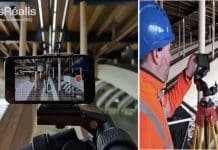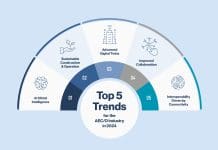Stuart Clark, managing director at Russell & Russell Business Advisers, examines five key issues facing construction companies as restrictions ease and the economy starts to recover
Increasingly, nimble, smart, innovative companies stand out from the crowd. Take, for instance, Livingston-based Brewster Brothers, which has positioned itself at the heart of the circular economy as a successful construction recycling operator.
After several incarnations, ranging from farming to property, haulage and residential development, the family firm now specialises in processing excavation and demolition waste and selling sustainable building materials to construction sites across Scotland.
Or, Paisley-based Safer Scotland, which has used the latest technology to transform site security from its traditional guarding model to a remote and efficient operation employing techniques of facial recognition, mask recognition cameras, automatic number plate recognition and up-to-the-minute CCTV.
Or, again, Cumbernauld-based Indeglas, which has developed links with the world’s leading glass manufacturers to push the boundaries of creativity in the application of internal glass, as well as providing construction partners with a trusted, approved supplier.
All three are dynamic Russell & Russell clients, which, while many other services and manufacturing suffered badly, have bounced back from the Spring 2020 shutdown.
What they have in common, aside from the commercial guidance we contribute, is a willingness to embrace the new and, as the pace of change in the construction inexorably quickens, this will prove to be an invaluable asset.
Looking at the obstacles that have been placed in their paths, construction companies in the UK might have been expected to have endured a rotten year; but in many cases, as they advance warily into 2021, the opposite is true.
But, as so many businesses clear backlogs of work and look for new opportunities, forward-thinking firms need to be aware of the huge number of issues that could blow them off course, not to mention the temporarily benign conditions that could navigate them to calmer waters.
Here are the top five issues that should be on the boardroom agenda as the building season starts once again to pick up pace.
1 (& 2): Cashflow, cashflow, cashflow
The money that is flowing in and out of a business can be just as important as profit when it comes to determining performance. As one of the Big Four accounting firms says, managing a small business without a cashflow forecast is a bit like driving at night with sunglasses on. You may be going in the right direction, but not for long.
This is particularly relevant at the moment as the government introduced Reverse Charge VAT legislation on March 1, despite strong warnings from trade associations up and down the country that it will restrict cashflow, especially for smaller firms, at the worst possible time.
Reverse Charge VAT changes how cash flows through the supply chain as subcontractors will no longer charge VAT, which currently they can hold on to until it is time to pay it to HMRC. Instead, only the firm at the top of the supply chain will charge VAT to the end client, which will then be paid to HMRC.
The changes will particularly impact SMEs that provide both services and materials, because they will have to pay VAT on the materials they purchase, but will not be paid the VAT by their customers. For a significant number of construction companies, this will be unsustainable.
Know your numbers
One of the idiosyncrasies of the bizarre year we have just lived through is that some businesses which have had to spend more time planning safe, socially distanced working have actually seen their margins improve.
This is most likely a direct consequence of looking at projects in more detail – on top of dealing with PPE, signage, distancing, guidance and training – and breaking work down, consciously or not, in line with the principles of Adam Smith’s division of labour.
More time in planning has also allowed firms to critically examine inefficiencies and challenge costing assumptions – directing them to the conclusion that doing less work at the right price instead of lots of work at the wrong price can have a positive and healthy effect on margins.
It is important to get reporting sorted, to root out under-priced or inefficient projects, to extract yourself from loss-making contracts and to be able to clearly identify the margin on each job.
Tax planning
Firms emerging from last year’s restrictions and considering capital expenditure should be ready to make the most of the current temporary increases to capital allowances.
Another Covid-related opportunity is the extension to March 2022 of the VAT payment deferral scheme. If a company has already taken advantage of deferrals, it has the choice of paying the full amount before 31 March this year or opting in to the VAT deferral new payment scheme, which allows for interest-free instalments.
Construction companies should also be aware of the possibilities of research and development tax reliefs which, contrary to some popular misconceptions, are not confined to scientists in white coats. They can relate to processes and systems, or simply innovative ways of doing things, and can even generate a welcome lump sum.
Tax liability should never come as a shock to anyone, and it is only responsible to work out your tax percentage across all obligations and make sure an adequate amount is lodged in the tax account.
Guarantees
Many people buying construction services are driven, by instinct or necessity, towards the lowest bid, but they can be persuaded in the direction of a higher fee if they feel that the quality of the work is likely to be of a significantly better standard.
For many responsible small firms, the professional imperative to get it right for clients is an effective guarantee in and of itself, in terms of domestic construction work, the worth of the guarantee often comes down to the contractor’s personal integrity.
In bigger work, a subcontractor’s personal promise of added value – for instance, that his teams will arrive on site on time and in good order and leave the site in good condition – can often be enough to secure a higher price and improve sales conversion rates.
Here’s to a 2021 that we can build on!
Stuart Clark
Managing director
Russell & Russell Business Advisers
+44 (0)141 332 6331
stuart.clark@russell-russell.co.uk
Twitter: @RRaccountants
LinkedIn: Russell&Russell

















